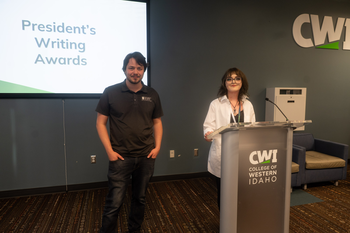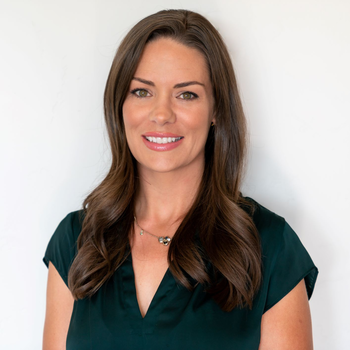
President's Writing Awards
Ready to show off your writing skills? College of Western Idaho's (CWI) annual President's Writing Awards contest celebrates the power of student voices across campus. Whether you are into storytelling, research, poetry, or analysis, there is a category for you. Join us in highlighting the importance of writing across disciplines, and take your shot at winning a cash prize!
Submission Deadline: Feb. 19 by 11:59 p.m.
Contest Rules
To enter the President's Writing Awards, you must be a current CWI student and follow these contest rules:
- All submissions must be original coursework written at CWI — previously published work is not eligible.
- You may enter more than one category, but only one submission is allowed per category.
- Each piece may only be submitted to one category.
- Entries submitted to the wrong category will not be moved or reassigned.
- Submissions that do not meet category criteria or contest rules will be disqualified.
- Contest organizers will not make edits to help submissions meet requirements.
- Staff members enrolled as students at CWI are welcome to participate. Faculty members are not eligible.
Awards
Awards will be given for first, second, and third place in each category.
- 1st Place – $500
- 2nd Place – $350
- 3rd Place – $200
If you are selected as a President's Writing Award recipient, please be aware accepting this award may affect your financial aid eligibility. Should you have any questions or need further clarification, contact Financial Aid at financialaid@cwi.edu.
Categories
First-Year Writing
- Essay completed for 101-level courses (e.g., CWID 101, ENGL 101, etc.).
- Essay should not exceed 10 pages.
Creative Nonfiction
- First-person account that explore the writer's experiences or observations.
Fiction
- Short story — a complete, stand-alone piece of fiction.
Poetry
- Poem of any length and form.
Critical Analysis
- Critical evaluation or analysis of a piece of literature, a theatrical performance, a work of visual art, a historical moment, a philosophical argument, a social movement, etc.
Literature Based Research
- Research essay analyzing published sources.
- Documentation style should be specific to discipline.
- Essay should not exceed 20 pages.
Original Research
- Report of findings from original research conducted by the student on a topic through experiments, surveys, observations, lab reports, etc.
- Documentation style should be specific to discipline.
Workplace Writing
- Document created for a professional setting to provide instruction, direction, or explanation.
- May include brochures, grant requests, business proposals, memos, press releases, etc.
Submissions
Submitting your writing is easy — just follow these steps:
- Remove all identifying information (e.g., your name, instructor's name, class, etc.) from the manuscript.
- Save your work as a .doc, .docx, .rtf, or .pdf file.
- Submit online through the link below using your CWI login.
- Include with your submission:
- Your name
- Preferred email
- Student ID number
- Class, semester, and name of instructor the submission was written for
By submitting your work to the President's Writing Awards, you confirm your work is original and free of plagiarism. Instructors will verify finalist submissions were completed as part of CWI coursework.
Scoring & Selection
Once your work is submitted:
- Your piece will be read and ranked by a panel of three CWI instructors.
- Finalists in each category will be sent to the President of the College for final judging.
- First, second, and third place winners in each category will be notified via email and celebrated at the Connections Conference Awards Ceremony in April.
- To receive prize money, winners must submit a W-9 form.
Past Winners
2025 President's Writing Awards Winners
First-Year Writing
- First place: Aeron Johns, "To be a Statistic”
- Second place: Lynnay Hogg, "Graduation”
- Third place: Soren Ashcraft, "Facial Recognition Technology: Orwellian or Innovative?"
Creative Nonfiction
- First place: Rose Parham, "Practically Unsinkable”
- Second place: Ashley Renteria, "Our Children's Danger”
- Third place: Rheya Turner, "Wasting Disease”
Fiction
- First place: Kenton Piper-Ruth, "Heavy”
- Second place: Rose Parham, "The Warden”
- Third place: Jenessa Branon, "Under the Surface”
Poetry
- First place: William Spickelmire, "In the Cabinet”
- Second place: Ashley Renteria, "Echoes of Choice”
- Third place: MariCruz Aguilar-Gallup, "Fuck the New 'Greats'”
Critical Analysis
- First place: MariCruz Aguilar-Gallup, "Breaking the Boxes”
- Second place: Austin Negaard Walters, "The Civilian Conservation Corps, Putting America to Work”
- Third place: Bolt Buckner, "The Innovative Advancements in Explosives and Chemical Weapons During WWI”
Literature-Based Research
- First place: Taylor Hug, Ella Hess, Oliver Jensen, and Kacie Mize, "Counterfactual Thinking and Personality Disorders: A Study of Self-Perception and Worldview”
- Second place: Ty Stanley-Kershner, "Construction Allies: Basque Diaspora as International Advocates for the Homeland”
- Third place: Katherine Buckels, "The Pandemic of Hate: The Rise of Anti-Asian Hate Crimes in America”
Original Research
- First place: Andrea Alvizo, "A Sense of Belonging: A Survey About the Role of Family Support and Social Clubs on Sleep Quality, Anxiety, and Self-Esteem”
- Second place: Natosha McLaskey, "A Sense of Belonging: A Convenience Sample Survey of Racial Effects, Academic Success, and Social Clubs”
- Third place: Claire Westergard, "The Impact of Media Comparison, Attractiveness Exposure, and Thin Ideals on Body Image and Self-Perception in College Students”
Workplace Writing
- First place: Anna McLean, "Letter to the Editor”
- Second place: Garima Dhakal, "Introduction to Non-Destructive Testing”
Questions?

